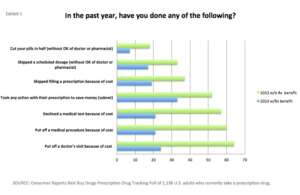Our national poll of more than 1,000 Americans shows many skeptical about generics
Ginger Skinner, Consumer Reports Best Buy Drugs
Americans take a lot of medicine. More than 4 in 10 (44 percent) regularly take a prescription drug, and among those, the average number they take is 4.5 medicines— 16 percent take 7 or more, according to the 2013 Consumer Reports Best Buy Drugs Prescription Drug Tracking Poll of 1,136 U.S. adults.
The national telephone poll found that the high costs all those medicines too often can lead to risky behaviors and force families to choose between the medications they need and paying other bills. More than half (57 percent) of those we surveyed reported taking steps in the past year – some of them potentially dangerous – to curb costs. In addition, 30 percent failed to comply with prescriptions from their doctor. Other measures to save money included not filling a prescription (17 percent), skipping a scheduled dose (14 percent), and taking an expired medication (14 percent). People who didn’t have insurance coverage were hit the hardest—they were far more likely to have skipped filling prescriptions and refused, tests, treatments and doctors visits because they couldn’t afford them. (See Table 1. and Table 2 below.)
Americans’ personal finances were affected in other ways, too. Three in 10 (29 percent) reported cutting back on entertainment and dining out, 19 percent spent less on groceries, and 15 percent put off paying other bills in order to afford their prescription drugs.
Table 1

Table 2

Doubts about generics prevalent
Despite struggling to pay for prescriptions, Americans remain skeptical about generic drugs. Nearly a fourth of those aware of generic drugs (23 percent) said they are not as effective as brand-name medications, 13 percent said they’re not as safe, and 21 percent said they don’t trust generics as much as brand-name drugs. Even so, when asked if they were willing to switch from a brand-name to a generic drug, nearly two-thirds (64 percent) said they were “very willing.”
Drug ads lead to higher costs
One reason for Americans’ reluctance to trust generics could be related to the marketing of brand-name drugs. Overall, 18 percent of Americans currently taking a medicine have asked their doctor to prescribe a drug they learned about from an advertisement, and among them, 63 percent said their doctor complied. Moreover, 57 percent of those taking a medicine have accepted free drug samples from their doctor. Free drug samples are often a promotional tactic used by drug manufacturers as a way to get consumers acquainted with newer and usually more expensive drugs.
Patients and doctors reluctant to discuss costs
Despite the difficulties consumers face paying for medicines, some are still uncomfortable discussing costs with their doctor or pharmacist. Just half had spoken with their doctor about switching prescriptions, and of those, slightly more than a third (38 percent) mentioned a reason related to cost, including wanting a less expensive medication or one covered by insurance. Almost no one (5 percent) found out about the cost of their medication at the doctor’s office. Instead, most (61 percent) find out about the cost when they pick up their prescription from the pharmacy.
One encouraging finding: roughly 9 in 10 consumers aware of generics said they were willing to change to a generic. However, though generic drugs can provide huge savings, sometimes priced as much as 95 percent less than brand-name medication, four out of 10 respondents said their doctor sometimes or never recommends generics over brand-name drugs.
What you can do
With consumers spending upwards of $1,000 a year on prescription drugs, keeping money in your pocket while getting treatment for what ails you is no easy feat. So it’s crucial that you be assertive and tell your doctor that cost, as well as effectiveness, matters.
Ask about generics, stopping drugs you no longer need, and whether it’s safe to split your pills in half. Following these surprising tips can help lighten financial your burden and keep money in your wallet. And make sure you get the right insurance, with the drug coverage that works best for you. Our advice on navigating the new health law and picking a good insurance plan can help.
Finally, check out our Best Buy Drug reports. We rate nearly two dozen common drug classes, including those used to treat allergies, diabetes, heartburn, high blood pressure, high cholesterol, migraines, and sleep problems on how well the drugs work, their risk of side effects, and price.
